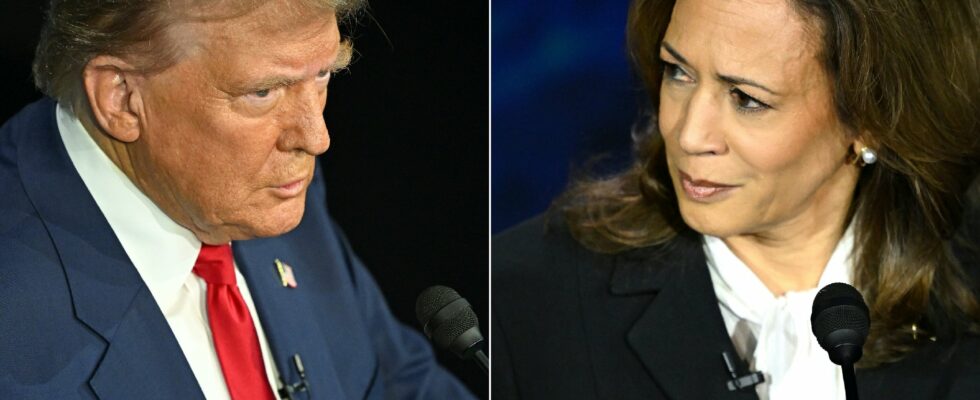Polls are not an exact science. The example of the 2016 American presidential election left a bitter demonstration of this for Democrats. While Hillary Clinton was several points ahead of Donald Trump in the swing states – these famous states likely to swing to one camp or another – it was finally the Republican candidate who settled into the Oval Office at the beginning of 2017. Eight years later, and only a few weeks before the next presidential election, the fear that history will repeat itself worries the Democratic Party more than ever. Even more so at a time when, unlike her predecessor, Kamala Harris is only a few points ahead of her opponent in the key states.
In Michigan and Wisconsin, for example, the gap between the vice president and Donald Trump is only 1 or 2 points, according to an average of several polls. Another bad omen for the Democratic camp: a survey by the New York Times/Siena reveals that the “post-debate rebound” of Kamala Harris – considered almost unanimously by observers as the winner of the sequence – is the weakest ever recorded by a candidate who has won a debate in the 21st century. Worse, over the last three weeks, support for the MAGA champion (for Make America Great Again, campaign slogan used by Ronald Reagan during the 1980 presidential campaign and taken up by Donald Trump) has progressed in three states of the Sun Belt – Arizona, Georgia and North Carolina.
Thus, he is ahead of his rival by 5 points in the first, four in the second and two points in the third. For our colleagues at New York TimesDonald Trump’s progress in these states won by the Democratic camp in 2020 – with the exception of North Carolina – is explained among other things by the dominance of a feeling of general decline. “Polls have revealed that voters in this part of the country are worried about their own future and the future of the nation, which suggests that Donald Trump’s dark campaign rhetoric – ‘Our country is going down the drain, we are a failed nation,’ he said during the debate – could resonate with some voters,” the American daily deciphers.
Trump, master in the art of making the polls lie
Another source of concern for Kamala Harris’ campaign team: the narrowing margin separating them from their Republican opponent. In the previous two presidential elections, Donald Trump demonstrated his ability to narrow the gap that polls gave him with his opponents at the ballot box. In 2020, for example, the former real estate mogul lost to then-Democratic candidate Joe Biden, with much narrower margins than those predicted by opinion institutes. “In the 2016 and 2020 presidential elections, pollsters underestimated Donald Trump’s performance,” confirms Patrick Flynn, a data journalist for the site Focaldata.
According to data compiled by the platform specializing in the collection and analysis of public opinion data, the Democratic candidate’s lead over Donald Trump was 3.9 points lower than the polls predicted in 2020 and 1.8 points lower than the polls predicted in 2016. Surveys by the New York Times even show that he could win the seven key states identified this year – the seventh being Nevada – if he exceeds the polls’ forecasts with the same margins he had in the 2020 election. We can therefore better understand why a Democratic senator slips to the American specialist site The Hill : “I don’t think the current polls mean much.”
The specter of the hidden vote
Still with our colleagues from Hillanother progressive senator tries to explain this gap between the theoretical – the polls – and the real – the result at the end of the vote. First, many conservative voters “may not want to interact with pollsters”. Second, some would be “reluctant to speak openly about their political opinions”, and would not dare to admit to voting for Donald Trump. So there could be a dark figure of support for the Republican billionaire. A sort of hidden vote that would mask a possible advantage for Donald Trump.
In France, the notion was recently brandished in 2022 during the presidential election. Faced with polls that showed Eric Zemmour losing, his entourage tried to reassure his electoral base by defending the idea that there would be moral modesty in voting for a far-right party. Across the Atlantic, this thesis is more widely circulated by the Democratic camp than by the Trump camp. “The only explanation I can find is that people feel embarrassed,” points out, for example, the senator interviewed by Hill. While another, elected in the swing state of Georgia, evades: “After all, the only poll that matters is the one from November 5, right?”
